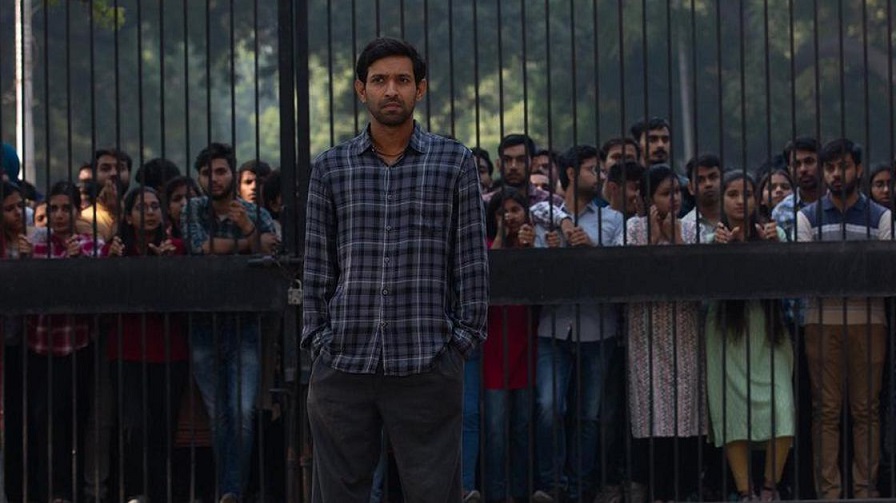12th Fail: A done to death template elevated such that the cream rises from the crop, due to a distinctive directorial voice and a fantastic lead performance.
12th Fail belongs to a genre of films dealing with the underdog narrative. In a country as populated as ours, the sheer number of aspirants who are after a position in the government or any job that would vault them to the higher strata of society is paramount. Thus, in that regard, it isn’t surprising that the bestselling books in bookstores are preparatory books for competitive exams. The corollary also shows a similar number of stories being dramatized about this narrative in the web series space.
The web series space, especially ones dominated by TVF, has made a cottage industry out of creating these narratives, either based on a true story or based on a template and crafting an original tale. The pattern that arises as a result of the current overpopulation of these stories is stagnation and an apparent lack of heart. The story has become beholden to the formula, rather than the template’s formula serving as the beating heart of the story.
In a structural sense, 12th Fail is a typical underdog story, based on the eponymous non-fiction book about the life of IPS Officer Manoj Kumar Sharma and his struggles from extreme poverty to becoming an IPS officer. The difference in Vidhu Vinod Chopra’s film isn’t only the unique wrinkle of the story, because, truthfully, there isn’t much. It is the storytelling, especially the technical aspects, that stands out.
The camerawork is handheld, for the most part, giving the viewer a feeling of floating between perspectives. When required, it generates a feeling of solipsism such that the viewer is completely invested in the trials and tribulations of Manoj Kumar Sharma, played here with almost flawless sincerity by Vikrant Massey.
Chopra cleverly manages to skew the poverty-porn narrative that could be expected to elicit pity from a lesser film. There are moments where the camera knows how to show the extreme tribulations that Massey’s character undergoes while trying to sustain himself as well as studying for the UPSC. The camera, however, doesn’t luxuriate in these moments. It lingers on them just enough for the viewer to register and empathize before cutting away to the subsequent section of the narrative.
There are generic elements in the story that need to be addressed. The romance plot that Manoj has with Sraddha feels unnecessary and superficial at a glance, injected to satisfy the commercial needs of the audience. Having said that, all these moments exist as tropes because they have been effective in the past. One of the reasons well-worn tropes like these work in 12th fail is because of the sound design employed in this film. There is a complete lack of background score underscoring any emotional sections, choosing only the diegetic score to ground the narrative. There are also moments of sharp cutting and completely removing the sound from one scene to the next to hone the impact of that scene as well as create a jarring dissonance. It is deliberately forcing the viewers to pay attention to the reality of the events occurring on the screen rather than registering them as checkpoints in a template-based narrative.
That is not to say that a background score or song is completely absent. Rather, they are used in montage sequences, utilizing a hagiographic mode of storytelling to move the film along.
12th Fail also has some wrinkles in its screenplay. Chopra being the screenwriter brings a somewhat personal touch to the whole storytelling. Some elements feel almost like his direct commentary, as if he is intentionally trying to remove the romanticism of poverty and being poor. He intentionally crafts the story in a fashion where Manoj’s tenacity and his proclivity to “manage” any situation become his pitfalls in achieving his true potential. He finally has to accept help from his well-wishers to understand his potential. Through this, Chopra also cleverly interweaves the character-arc progression of Shraddha. Her character doesn’t only exist at the service of Manoj’s character arc, but rather her own, which gives the world a lived-in and realistic feel. However, a few more scenes to develop these moments or even focus on Shraddha’s struggles in isolation would have been revealing.
However, that would be antithetical to the overall solipsism of the 12th fail, which is a choice taken by the source material and also by Chopra himself. For narratives with inspirational stories as their backbone, a strong direction needs to work in conjunction with stronger performances. Vikrant Massey, as the titular “12th Fail,” with dreams to live bigger than his circumstances would feasibly allow, brings a sense of belief and determination to his performance. The smile across Massey’s face even when faced with adversity remains consistent, such that when allowed to be vulnerable, the impact hits harder. He is also supported ably by strong supporting performances, giving flesh and blood to characters far more than what the page affords them. The character arc and its resultant study are compelling enough that some of the minute logical fallacies of the plot can be ignored, or contrivances could be taken in stride. Chopra deserves credit for keeping the suspense going throughout the film, even though the climax is unavoidable. “12th Fail” proves that template-based storytelling doesn’t just have similar visual or aural cues. A directorial vision is sometimes the key difference in crafting a story that becomes universal, transcending the formula that has kept these stories consistent.

Leave a Reply
You must be logged in to post a comment.